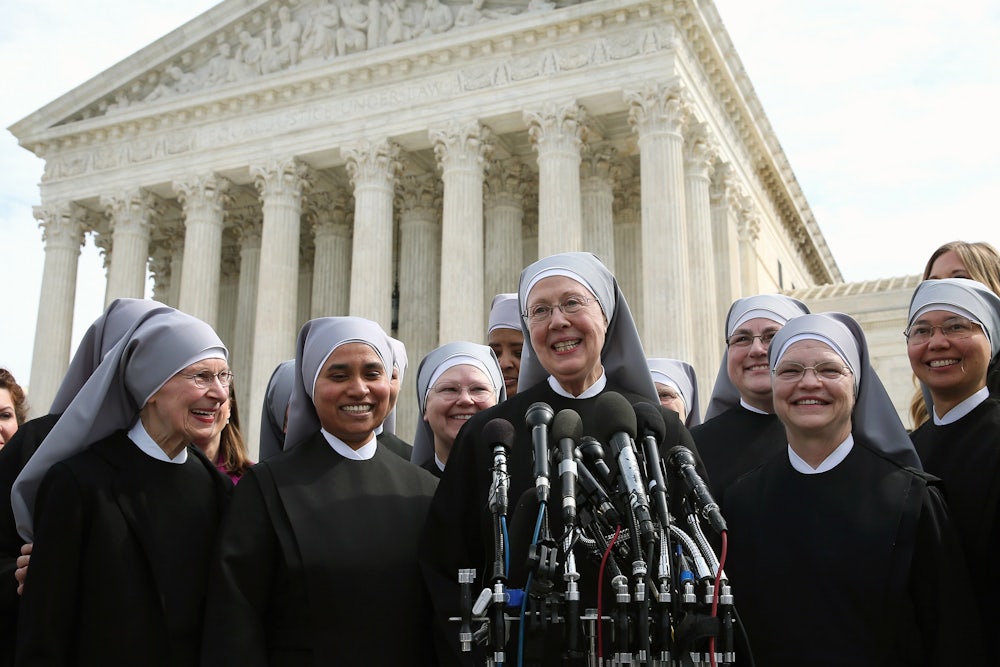The Supreme Court has affirmed the rights of certain employers to deny contraceptive coverage in their health plans in a case involving a private Catholic health service challenging a long-fought-over provision of the Affordable Care Act. This front in that battle concerned the Trump administration’s rules granting employers, schools, and other entities who must offer a health plan “moral” or “religious” exemptions from covering contraception, as mandated by the health care law. In a 7–2 ruling in Little Sisters of the Poor Saints Peter and Paul Home v. Pennsylvania, the path was cleared for Trump’s rules to move forward.
“For over 150 years, the Little Sisters have engaged in faithful service and sacrifice, motivated by a religious calling to surrender all for the sake of their brother,” wrote Justice Clarence Thomas, for the majority. “But for the past seven years, they—like many other religious objectors who have participated in the litigation and rulemakings leading up to today’s decision—have had to fight for the ability to continue in their noble work without violating their sincerely held religious beliefs.”
The Affordable Care Act’s rules mandating private health plans cover a range of contraceptive care—including 18 methods explicitly identified by the Food and Drug Administration—have not changed. But today’s ruling expands the range of employers (and others who offer insurance plans, like schools) who are allowed to exclude some or all of these methods if they have religious or moral objections.
Justices Ruth Bader Ginsburg and Sonia Sotomayor recognized this denial of access in their dissent. “For six years, the Government took care to protect women employees’ access to critical preventive health services while accommodating the diversity of religious opinion on contraception,” Justice Ginsburg wrote. A win for Little Sisters and the Trump administration exemptions may be a win for “religious freedom,” but it cannot be one without also being a loss for reproductive freedom. As Ginsburg continued later in her dissent, “The expansive religious exemption at issue here imposes significant burdens on women employees. Between 70,500 and 126,400 women of childbearing age, the Government estimates, will experience the disappearance of the contraceptive coverage formerly available to them; indeed, the numbers may be even higher.”
As in prior efforts to allow employers and businesses exemptions based on “religious freedom”—whether that is license to fire LGBTQ people from their jobs or refuse them service, or to refuse to provide abortion or transition-related care—such exemptions can grant license to legally discriminate. To base that license on faith is to obscure the material harm it causes to people of any (or no) faith seeking health care, employment, or public accommodation.
Since the ACA became law, the mandate for such broad contraceptive coverage in health plans has been a target, for the Republican Party, for the U.S. Council of Catholic Bishops, and the “Christian legal army” Alliance Defending Freedom, the organization that represented the private business Hobby Lobby in its Supreme Court case seeking exemption from the mandate. The right’s collective anti-abortion efforts, ostensibly also an issue of morality, have long spiraled out, seeking to control essential acts of self-determination: how a person expresses their gender, or has sex, or has children.
“If we step back, we can see the pattern and the underlying, coercive motivations behind the Trump administration’s actions,” said Guttmacher Institute associate director of policy analysis Adam Sonfield in a statement today. (The Guttmacher Institute, a leading reproductive health and rights group, filed an amicus brief in the case, seeking to prevent the Trump regulations from going into effect.) “This attack on private insurance coverage of contraception is tied to the administration’s destructive overhaul of the Title X national family planning program, its relentless attempts to gut the Affordable Care Act, its harmful ‘refusal of care’ rules, and its ongoing efforts to ‘defund’ Planned Parenthood and undermine Medicaid coverage of family planning care.”
The religious freedom issue is still live with the court—the majority opinion is clear on that. While this may still appear to be another chapter in the culture war, it is, more accurately, a strategy to deny people in the United States full bodily autonomy. That’s always been the fight.
